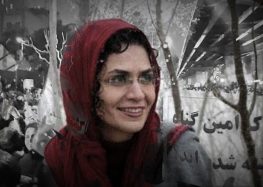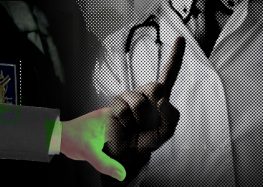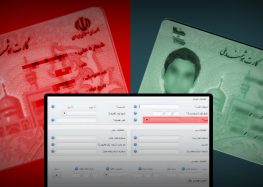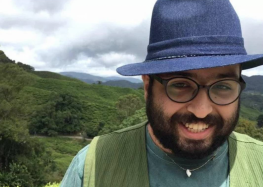Ahmadinejad’s Media Blitz Unfolds as Young Activists Receive Harsh Sentences
Prominent Human Rights Defenders, Emad Baghi and Shiva Nazar Ahari Receive Six Year Prison Sentences
Mother of Imprisoned Journalist Calls for Release of her Sick Daughter
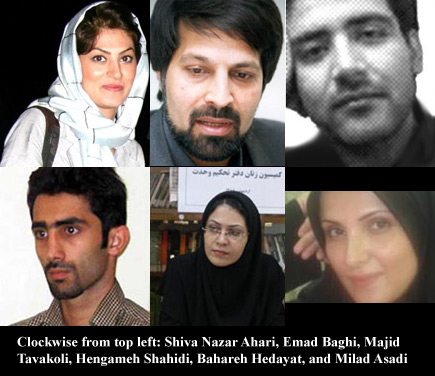 (21 September 2010) – While Iranian President Mahmoud Ahmadinejad has proclaimed Iran’s respect for human rights and freedoms during his current New York media blitz, several prominent young Iranian students, human rights defenders, and journalists received harsh jail sentences in recent days, the International Campaign for Human Rights in Iran said today.
(21 September 2010) – While Iranian President Mahmoud Ahmadinejad has proclaimed Iran’s respect for human rights and freedoms during his current New York media blitz, several prominent young Iranian students, human rights defenders, and journalists received harsh jail sentences in recent days, the International Campaign for Human Rights in Iran said today.
In several cases, young Iranians have been jailed for “insulting the President,” the Campaign emphasized. Overall, at least 500 prisoners of conscience are held in Iranian jails.
“The hypocrisy and cynicism of Iran’s president on display in New York insults the dignity of all whom he claims to represent, and the integrity of the international human rights system,” said Aaron Rhodes, a spokesperson for the International Campaign for Human Rights in Iran.
Two internationally recognized human rights defenders, Emad Baghi and Shiva Nazar Ahari, were sentenced to six year prison terms as Ahmadinejad arrived in New York. An appeals court also confirmed an eight and a half year sentence for student leader Majid Tavakoli. Other prominent young activists, such as Bahareh Hedayat and Milad Asadi, languish in Iranian jails, serving lengthy prison sentences.
Since June 2009, hundreds of prominent students and activists have been unjustly detained and sentenced, deprived of their fundamental rights, education, careers, and in many cases without access to their lawyers and families. Many have fallen ill due to severe physical and psychological mistreatment inside prison, and need urgent medical care.
Shiva Nazar Ahari, a young human rights activist and journalist, received a sentence of six years in prison in exile in a remote area, and 76 lashes. She was convicted of the crime of moharebeh, or enmity against God, a charge her lawyer, Mohammad Sharif, says is not supported by any evidence in her case file. Nazar Ahari was arrested on 20 December 2009, and held until she was temporarily released on $500,000 bail on 12 September 2010. Her lawyer will request an appeal.
Majid Tavakoli, a young university student and activist, will spend eight and a half years in prison for a number of alleged offenses including “insulting the President,” a sentence that was upheld by an appeals court this week. Throughout his imprisonment and trial, which followed delivering a speech on his university campus, Tavakoli did not have access to his lawyer.
Emad Baghi, who received the 2009 Martin Ennals Award, was sentenced today to six years in prison for his human rights reporting and documentation. The Martin Ennals Award, awarded by major human rights organizations such as Amnesty International, Human Rights Watch, and FIDH, is one of the most prestigious international human rights recognitions. Baghi was previously sentenced to one and a half years in prison in another case, and is to serve a total of seven and a half years in prison.
An appeals court upheld the nine and a half year prison term of Bahareh Hedayat, a student activist and women’s rights campaigner, in July 2010. One of the charges for which she was convicted was insulting the authorities, including the President. Milad Asadi is another student activist who was arrested and sentenced to seven years in prison for charges that include insulting the Supreme Leader and President.
At a press conference in New York on 17 September, Nobel Peace Laureate and human rights lawyer Shirin Ebadi stated:
“The plight of prisoners, specifically in the areas of health and nutrition, has gotten worse. Whoever is bailed out from prison, and usually on very heavy bail, has to go to the hospital directly. The example I will give you is Ms. Narges Mohammadi who is under treatment for her periodic muscular paralysis after she was released from jail. Unfortunately, it is not just Ms. Mohammadi who has become sick. We have numerous political prisoners who are not being treated.”
“My proposal here is that if Mr. Ahmadinejad claims that Iran is a free country, that physicians from Doctors Without Borders go to Iran and visit the Iranian prisoners. Unfortunately, the situation of political prisoners is such that they have not only been unjustly convicted, but when they leave the prison, they are not healthy, either,” Ebadi added.
In an interview with the Campaign this week, an imprisoned journalist’s mother talked about her daughter Hengameh Shahidi’s mounting health problems and lack of proper medical care inside Evin prison. Hengameh Shahidi is a journalist who is serving a six-year prison sentence.
“Hengameh has developed rheumatic heart disease, kidney problems, stomach problems, and severe depression in prison. …The prison doctors have said that she needs outside medical attention in order to address her ailments. I don’t know why the American hiker would be released for her illness, but my child cannot go on a medical leave for treatment. After two months, eight days ago they asked for a $600,000 bail in order to release her on medical leave. They know that Hengameh’s parents who are retired teachers would not be able to post a $600,000 bail. …The worst thing for a mother is to see her child sick and be unable to help her. If I were to sell whatever I own in this world I could not come up with $600,000. After I get her out, I will still have to spend thousands of dollars on her treatment. My house is tied up as collateral for the first time she was arrested and released on bail. I have nothing else. They know all this. If they don’t want to grant her medical leave, they should just say it and treat her inside the prison,” said Shahidi’s mother.
The International Campaign for Human Rights in Iran appealed for the immediate release of all prisoners of conscience in Iran, and for the Iranian authorities to allow independent medical professionals to visit the prisoners at Iranian prisons in order to ascertain their condition and provide medical attention where needed.
“This would demonstrate, in a meaningful way, Iran’s commitment to human rights, as opposed to denials, obfuscations, and evasions,” Rhodes said.

